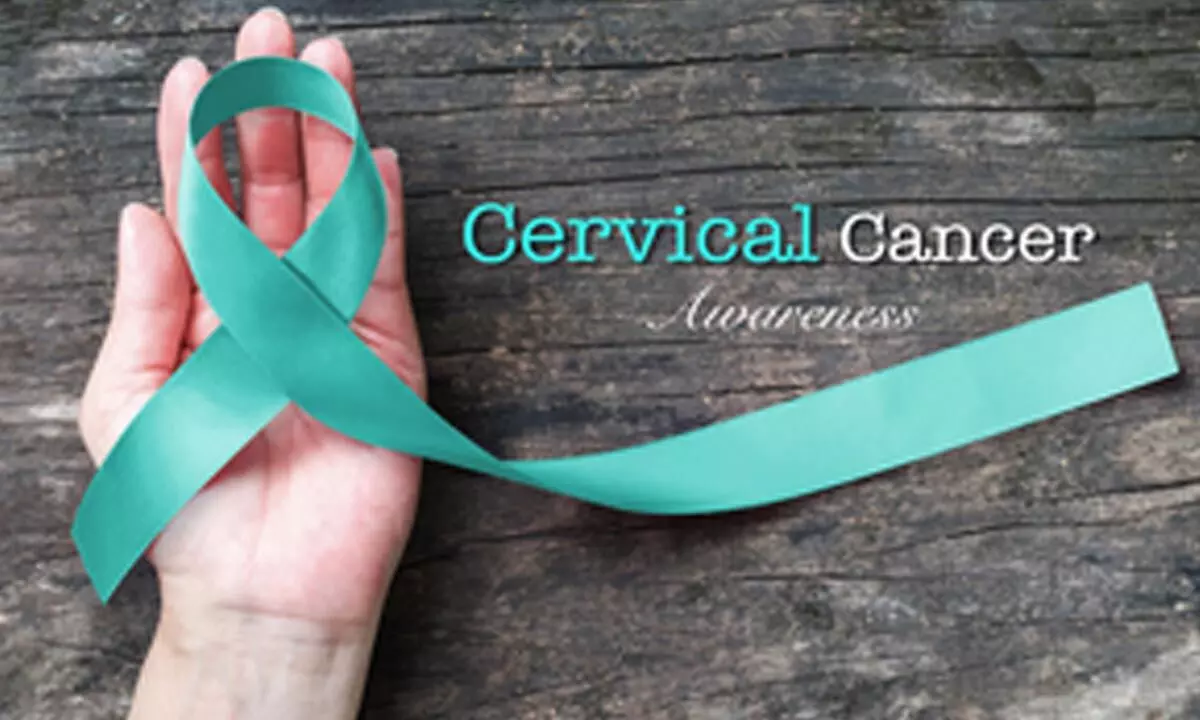Cervical cancer awareness: Break social stigma, enhance genital hygiene, say experts
Share :

World cervical cancer awareness month is a global healthcare event to raise awareness of cervical cancer, which is observed for the entire month of January every year. The theme for this year is ‘Learn. Prevent. Screen.’
Bengaluru: World cervical cancer awareness month is a global healthcare event to raise awareness of cervical cancer, which is observed for the entire month of January every year. The theme for this year is ‘Learn. Prevent. Screen.’
According to data from the National Cancer Registry Programme report, 10 per cent of women in Karnataka are suffering from cervical cancer. Every 7 minutes one woman dies of cervical cancer in India, experts say.
Most cervical cancers are caused by persistent infections with high-risk strains of human papillomavirus (HPV), a sexually transmitted infection.
Lack of awareness about the symptoms of cervical cancer among the general public, social stigma, and late diagnosis are the primary reasons for such alarming results. The experts have emphasised breaking the social stigma and enhancing genital hygiene.
Dr. Niti Raizada, Senior Director - Medical Oncology and Hemato Oncology, Fortis Hospitals, Bengaluru said that according to the latest GLOBOCAN data available for Karnataka reveals 4,826 new cases, constituting 3.9 per cent of all cancers in the state, surpassing the national average.
She said that in the year 2020, 3,190 deaths occurred, accounting for 8.6 per cent of cancer-related deaths, reflecting a higher mortality rate than the national average.
“Adopting a healthy lifestyle by abstaining from smoking, maintaining a healthy weight, and practising caution in sexual partnerships reduces the risk. Early detection is vital, involving regular screenings like Pap tests from age 21,” Dr. Raizada said.
She said that recognising symptoms such as abnormal bleeding or pelvic pain is crucial.
“Consistent use of condoms and maintaining good personal hygiene helps prevent infections. These measures collectively aim to secure a healthier future for women in Karnataka, mitigating the impact of cervical cancer,” she said.
Dr. Padmalatha VV, Consultant Obstetrician and Gynaecologist, SPARSH Hospital for Women and Children, Yeswanthpur, Bangalore explained that, every seven minutes one woman dies of cervical cancer in India according to reports.
Dr. Padmalatha said that the cervical cancer can be prevented by appropriate and timely administration of the HPV vaccination.
“It is highly recommended to start the vaccine for girls as early as 10 years, well before potential exposure to the virus and can be given up to 45 years of age,” she said.
She said that the incidence of cervical cancer has declined in the west due to effective screening programs and extensive HPV vaccination.
“While India has witnessed a rapid vaccination drive against cervical cancer, sustained momentum is crucial,” she said.
Dr. Padmalatha said that there persists a lack of awareness about HPV vaccination, particularly in rural areas of India, despite its proven benefits.
Dr. Pratima Raj, Associate Consultant – Gynaecologic Oncology, Manipal Hospital Old Airport Road, Bengaluru said that: “Cervical cancer is the cancer of the cervix - the opening of the uterus. In the year 2023, cervical cancer accounted for 12 per cent of all cancers diagnosed in women in Karnataka as per the available statistics.”
Dr. Pratima Raj explains that bleeding between menstrual periods, watery or bloody discharge from the vagina, and foul odour in vaginal discharge, excessive menstrual days, excessive bleeding during menstruation, bleeding after menopause, pain or difficulty during intercourse, and bleeding after intercourse are the primary symptoms of cervical cancer.
Dr. Pratima said that it is crucial to seek medical advice and check-ups without neglecting the symptoms or succumbing to shyness or fear about cancer and its treatment.
Dr. Vidya V Bhat, Fertility Specialist and Medical Director, RadhaKrishna Multispeciality Hospital said that the enhancing genital hygiene, undergoing regular Pap smears and HPV tests, and receiving timely vaccination (administered in three shots over six months) during the teenage or early twenties stage all contribute significantly to reducing the risk of cervical cancer.
“While breast cancer cases have surged, there has been a commendable 14 per cent reduction in cervical cancer incidents over the past decade in India, attributed in part to the introduction of a vaccine in 2008.
“Despite this decline, vigilance remains paramount, especially for women aged 30 years and above, particularly those from lower socioeconomic backgrounds who face elevated risks due to poor hygiene practices, Dr. Vidya V Bhat said.
She said that recognised risk factors encompass a family history of cervical cancer, multiple childbirths, prolonged use of birth control, engagement in multiple sexual partnerships, early sexual activity, as well as smoking and obesity.
She said that to proactively mitigate risks, women can adopt preventive measures such as steering clear of early marriages, delaying sexual activity, avoiding polygamous relationships, refraining from smoking, and limiting childbirths.
Dr. Abhilasha Narayan, Consultant - Gynaec Oncology, HCG Cancer Centre, Bengaluru said that most cervical cancers are caused by persistent infections with high-risk strains of human papillomavirus (HPV), a sexually transmitted infection.
“Over time, these infections can lead to changes in the cells of the cervix, potentially progressing to cancer. It often develops slowly, starting with pre-cancerous changes that can be detected through Pap smears or HPV testing. When diagnosed early, cervical cancer is highly treatable,” Dr. Abhilasha Narayan says.













